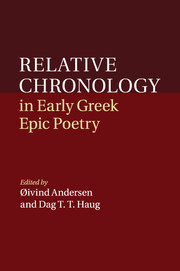Book contents
- Frontmatter
- Contents
- Notes on contributors
- Preface
- Abbreviations
- Introduction
- Chapter 1 πρῶτόν τε καὶ ὕστατον αἰὲν ἀείδειν
- Chapter 2 Relative chronology and an ‘Aeolic phase’ of epic
- Chapter 3 The other view
- Chapter 4 Late features in the speeches of the Iliad
- Chapter 5 Tmesis in the epic tradition
- Chapter 6 The Doloneia revisited
- Chapter 7 Odyssean stratigraphy
- Chapter 8 Older heroes and earlier poems
- Chapter 9 The Catalogue of Women within the Greek epic tradition
- Chapter 10 Intertextuality without text in early Greek epic
- Chapter 11 Perspectives on neoanalysis from the archaic hymns to Demeter
- Chapter 12 The relative chronology of the Homeric Catalogue of Ships and of the lists of heroes and cities within the Catalogue
- Chapter 13 Towards a chronology of early Greek epic
- Bibliography
- General index
- Index locorum
Chapter 2 - Relative chronology and an ‘Aeolic phase’ of epic
Published online by Cambridge University Press: 05 January 2012
- Frontmatter
- Contents
- Notes on contributors
- Preface
- Abbreviations
- Introduction
- Chapter 1 πρῶτόν τε καὶ ὕστατον αἰὲν ἀείδειν
- Chapter 2 Relative chronology and an ‘Aeolic phase’ of epic
- Chapter 3 The other view
- Chapter 4 Late features in the speeches of the Iliad
- Chapter 5 Tmesis in the epic tradition
- Chapter 6 The Doloneia revisited
- Chapter 7 Odyssean stratigraphy
- Chapter 8 Older heroes and earlier poems
- Chapter 9 The Catalogue of Women within the Greek epic tradition
- Chapter 10 Intertextuality without text in early Greek epic
- Chapter 11 Perspectives on neoanalysis from the archaic hymns to Demeter
- Chapter 12 The relative chronology of the Homeric Catalogue of Ships and of the lists of heroes and cities within the Catalogue
- Chapter 13 Towards a chronology of early Greek epic
- Bibliography
- General index
- Index locorum
Summary
Numerous attempts to establish the relative chronology of the songs of the Greek epos, or of particular passages therein, have depended on the linguistic evidence in our received texts. These studies, while producing some suggestive results, have not solved the problem of chronology for early Greek poetry. The language of epic developed in parallel with the colloquial speech of the singers in many ways, but the Kunstsprache has rules and tendencies which work counter to the diachronic development of the singers’ dialect. Also, assumptions about the history of the development of the epics heavily influence the definition of linguistic material as ‘archaic’. As we shall see below, one's model for the development of the songs of the Greek epos, whether through a series of dialectal ‘phases’ or through the diffusion of shared poetic material among various local traditions, has a profound effect on attempts to elicit chronology from the language of the epics.
The mixed dialect of epic
The dialect of the epics mixes archaic forms with innovations; it likewise mixes Ionic forms with forms showing Aeolic phonology and morphology. Linguistic archaisms by definition precede innovations, and concentrations of innovative forms are generally taken to indicate a later work or passage. Still, the presence of any linguistic innovation indicates that a passage could only have been composed after that innovation had occurred. For example, a (metrically guaranteed) ‘neglect’ of digamma could not reasonably have entered epic language until initial [w-] had lost consonantal force in some relevant dialect. Clearly, however, the effects of digamma persisted in epic singing well after the sound itself had disappeared, and thus, any apparent ‘observance’ of digamma, say, need not have entered the text before the loss of the sound in colloquial speech.
- Type
- Chapter
- Information
- Relative Chronology in Early Greek Epic Poetry , pp. 44 - 64Publisher: Cambridge University PressPrint publication year: 2011
- 3
- Cited by

